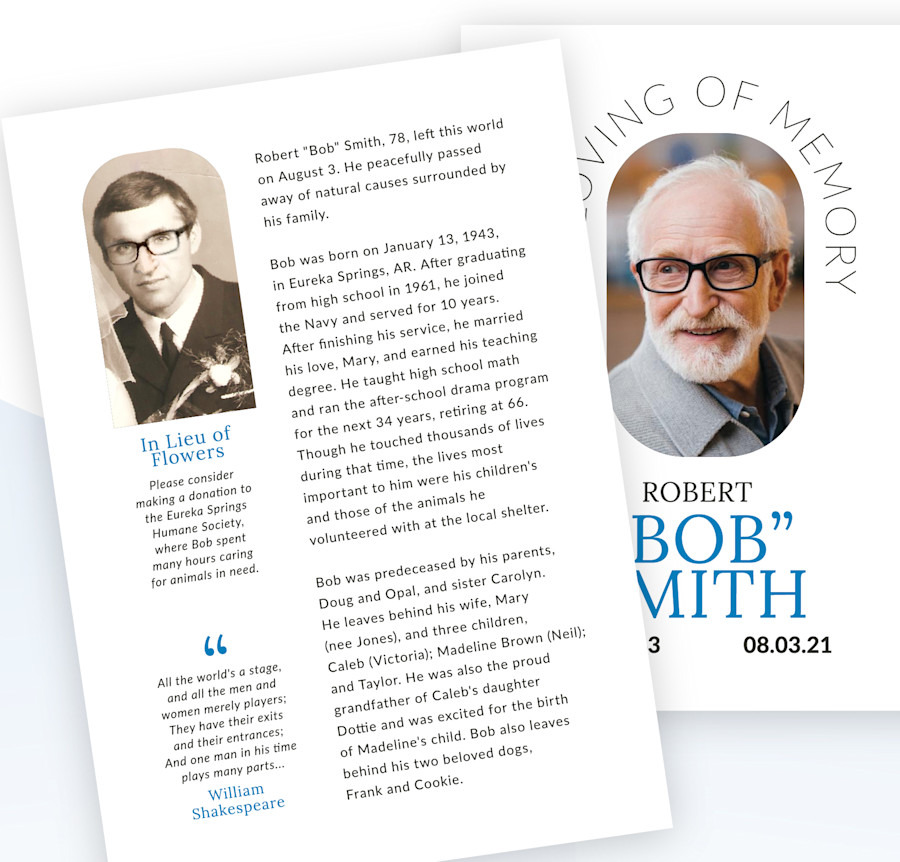Understanding Obituaries: A Comprehensive Guide

An obituary is more than just a notice of death; it is a means of honoring and remembering a person’s life and contributions. It serves as a public acknowledgment of a person’s passing and provides a platform for reflecting on their achievements, character, and the impact they had on others. This article delves into the purpose of obituaries, their historical evolution, and the key elements that make an obituary meaningful.
The Purpose of an Obituary
The primary purpose of an obituary is to announce the death of an individual to the community. It provides essential information about the deceased’s life, including details about their passing and arrangements for memorial services. This announcement serves to inform friends, family, and acquaintances of the loss and allows them to pay their respects.
Celebration of Life
An obituary also serves to celebrate the life of the deceased. It highlights their achievements, character, and the impact they had on others. By sharing stories and accomplishments, an obituary helps to preserve the legacy of the individual and offers a way for others to remember and honor them.
Informing and Engaging the Community
Obituaries just like Natasha Mae Fester Obituary provide important details about memorial services, such as funeral arrangements, visitation hours, and other ceremonies. This information allows community members to participate in the grieving process and support the family during a difficult time. Additionally, obituaries often include information on how to make donations to charitable organizations in the name of the deceased, providing a way for the community to contribute to causes that were important to the individual.
Historical Evolution of Obituaries
The concept of obituaries dates back to ancient civilizations, where death notices were often inscribed on monuments or written in historical records. In Ancient Rome, for example, commemorative inscriptions were used to honor notable individuals. These early practices served a similar purpose to modern obituaries by recording and remembering the lives of the deceased.
Development in Print Media
The modern obituary, as we know it, began to take shape in the 17th and 18th centuries with the advent of newspapers. Early obituaries were often brief and factual, focusing primarily on the announcement of death and funeral details. Over time, as newspapers became more widespread and accessible, obituaries began to include more personal details and reflections on the individual’s life.

The Digital Age
With the rise of digital media and online platforms, the format and dissemination of obituaries have evolved significantly. Online obituaries offer a more dynamic way to share information, incorporating multimedia elements such as photos, videos, and interactive guest books. Social media platforms have also become popular for announcing a passing and creating virtual memorials. Additionally, you can also explore related topics such as the Peso Pluma age, which may provide insight into other aspects of public figures and their impact.
Key Elements of an Obituary
An obituary typically includes essential details about the deceased, such as:
- Full Name: The complete name of the deceased, including any nicknames or maiden names.
- Date of Birth and Death: The dates of birth and death provide a timeline of the individual’s life.
- Cause of Death: While not always included, some obituaries may mention the cause of death, depending on the family’s preference.
Personal and Family Details
To personalize the obituary, it often includes information about the individual’s life and family:
- Biographical Information: Highlights of the deceased’s life, such as education, career achievements, and personal interests.
- Family Members: Names of surviving family members, including spouses, children, siblings, and other close relatives. It may also mention predeceased family members.
- Personal Traits and Achievements: Reflections on the individual’s character, hobbies, and accomplishments.
Service Details
The obituary provides information about memorial services:
- Funeral or Memorial Service Details: Dates, times, and locations of any services or ceremonies.
- Visitation Information: Details about public viewings or visitations, if applicable.
- Charitable Contributions: Information on how to make donations in the deceased’s name to charities or organizations.
Acknowledgements
Obituaries often include expressions of gratitude to those who have supported the family:
- Thank You Notes: Acknowledgments of gratitude to caregivers, medical staff, or friends who have provided support during the illness or grieving period.
- Special Messages: Personal messages of thanks or recognition from the family.
Writing an Obituary: Tips and Considerations
When writing an obituary, it is important to approach the task with respect and sensitivity. The obituary should reflect the life and values of the deceased while providing accurate and respectful information.
Include Relevant Details
Ensure that the obituary includes all relevant details about the deceased’s life, achievements, and the arrangements for memorial services. Providing complete information helps readers understand the significance of the individual’s life and the details of any upcoming ceremonies.
Proofread and Verify
Before publishing, carefully proofread the obituary to ensure accuracy. Verify all names, dates, and details to avoid any errors. An obituary is a lasting tribute, and accuracy is crucial for honoring the deceased appropriately.
Use Appropriate Language
Choose language that reflects the tone and style appropriate for the individual and their family. Obituaries can range from formal and traditional to more personal and reflective. The language should align with the family’s preferences and the individual’s personality.
Conclusion
Obituaries are a significant part of the grieving process and serve multiple purposes, from announcing a death to celebrating a life and informing the community. They provide a means for families to honor their loved ones and share their stories with others. As society continues to evolve, the format and dissemination of obituaries will likely adapt, but the fundamental purpose of remembering and respecting the deceased remains timeless. Understanding the role and significance of obituaries helps to appreciate their importance in both historical and contemporary contexts.





